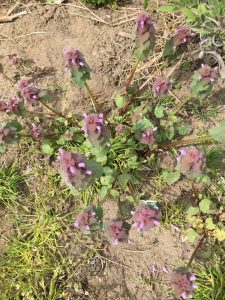I live in southern Etobicoke and we have a vegetable garden and couple of flower beds with perennials. We have rather sandy soil with clay deposits. Our area is just north of Lake Shore Blvd and we seem to enjoy a slightly more mild microclimate. My question relates to a new weed we have this year. I don’t know what it is but I have attached a picture. It’s in our vegetable plot and flower beds. I started pulling it out and as I was doing so noticed how many bees were attracted to it, especially bumble bees which we haven’t seen in a long time. I have to get rid of some of this plant but feel really conflicted about getting rid of plants that bees are attracted to early on in the season. First could you please identify this plant and second what do you suggest I do to manage it but not discourage bees. Thank you!

While its a bit difficult to tell from the photo, it appears the plant is Lamium purpureum, or red dead nettle. You are to be congratulated on your desire to provide plants for bees. Healthy bee populations are essential to biodiversity, and different bee species have an important pollination role in our gardens, wild lands and farms. There are over 400 species of bees in Ontario alone. Anything we can do to protect and encourage bee species contributes to the health of our ecosystems. Bumblebees are particularly effective pollinators, and like honey bees, they are social insects, living in colonies underground.
Rather than focus on preserving this volunteer plant, which is not something you have selected for your garden, you may want to consider planting a pollinator garden that provides food for key pollinator species. The Ontario Ministry of Agriculture, Farming and Rural Affairs has some great resources here for gardeners interested in helping pollinator populations.
If you are particularly interested in bumblebees, here is a list of plants that are especially attractive to bumble bees. If you really want to get involved, the site bumblebeewatch.org allows you to contribute to the science of bumble bee conservation by reporting sightings. This site also has a great range of resources on bumble bees as well as a range of guides and information on pollinator conservation.

